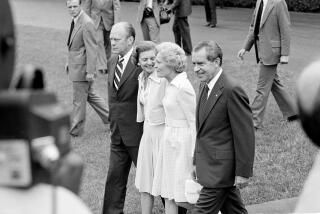‘Courage and Consequence’ by Karl Rove
Karl Rove is a true believer, as the subtitle to his memoir suggests, in a fighting faith. Much that vexes our current politics flows from the fact that he is an exemplar rather than a singular case.
“Courage and Consequence: My Life as a Conservative in the Fight” pretty much completes the recollections of those who surrounded George W. Bush during his eight-year presidency. Only former Vice President Dick Cheney’s book still is to come from those within the innermost White House circle. Rove, of course, was the political architect of all Bush’s successful campaigns, as well as those of dozens of other Republican candidates.
In the extensive news coverage leading up to Tuesday’s publication, much has been made of his admissions of tactical error -- failing to push back against charges that the administration misled the country into the Iraqi war; botching the post-Katrina response; predictable score-settling with prominent Democrats. More interesting are the vague and largely unexamined origins of Rove’s conservatism. As he tells it, he holds the views he does largely because he grew up in the mountain West, where self-reliance is prized, and because when, as a 10-year-old Denver boy, he put a Richard Nixon sticker on his bike, a little girl down the street whose family supported John F. Kennedy beat the heck out of him.
His own family was utterly dysfunctional -- his father, the book suggests, was apparently a closeted homosexual who ultimately divorced his mother, a habitual spendthrift who stole her children’s legal support payments. Only as an adult did Rove discover he was adopted. He was a champion debater in high school and became so deeply involved in electoral politics that he never took a degree, though he was just a couple of classes short. Later, when enrolled briefly at the University of Texas, he would acquire a life-long admiration for William McKinley because his mastery of new electoral technology would usher in decades of GOP dominance.
For a man who repeatedly used “family values” and “faith-based” considerations as wedge issues in his campaigns, there is in this book nothing of how his own two marriages failed nor why he, like Bush, remains unchurched. Still, it’s clear that his great disappointment was the failure of “compassionate conservatism” -- defined mainly as privatizing Social Security and Medicare supporting faith-based social services -- to accomplish a fundamental electoral realignment. For that, Rove blames the cowardice of the Republicans’ congressional delegations.
His is a Manichaean view of American society -- divided irremediably between dark and light, allies and enemies.
Rove the debater is at his dodgiest when he defends the Bush administration’s break with generations of American moral tradition and jurisprudence by adopting torture as state policy. First, he attacks House Speaker Nancy Pelosi and the congressional Democrats for denying their knowledge of the step: “Can we really expect CIA agents to carry out war policies if they fear that leaders of one of the two major political parties will punish them for good-faith efforts to protect America?” (There’s a classic straw man, since no such retribution has occurred, despite considerable pressure from the Democratic left.)
Then, Rove goes on to argue that the Geneva Conventions on the treatment of prisoners are not applicable to “Al Qaeda, since they protect only the combatants of signatory nations.”In other words, it’s OK to torture some people, but not others. Rove also dismisses the objections of conservative legal scholar Jack Goldsmith, who headed the Office of Legal Counsel under Bush, by arguing that while his legal arguments have to be taken seriously, “[T]hose of us serving in government at the time -- in the aftermath of 9/11 and when intelligence was collecting ‘chatter’ from terrorist operatives that indicated another attack was imminent -- this debate was not academic. . . .” Waterboarding, for example, is not torture -- according to Rove -- because “the president never authorized torture,” though he did approve waterboarding. Besides, again according to Rove, waterboarding -- for which convicted Japanese war criminals were hanged after World War II -- worked and extracted vital information from Abu Zubaydah, Ramzi bin al Shibh and Khalid Sheikh Mohammed. The latter point is disputed by many inside and outside of the intelligence community, and we’ll probably never know for certain, because the tapes of their interrogations have been destroyed. (Now, why do you suppose that happened?)
Even Rove’s most highly publicized admission of error -- though not quite an acceptance of responsibility -- comes with an explanation. As so many of the news stories based on leaked copies of “Courage and Consequence” have pointed out, Rove considers his singular shortcoming the failure to mount a push-back against those who charged the administration had misled the country into going to war in Iraq by falsely asserting Saddam Hussein’s possession of nuclear, chemical and biological weapons and by alleging his complicity in 9/11. One reason for the lack of rebuttal, the author writes, “was that we felt it was beneath the dignity of the president to refute such outlandish charges.” Moreover, “many people in the Bush White House were simply worn down by the Iraq debate. . . . Our critics pounded us relentlessly. And the public saw silence as a plea of nolo contendere. With a complicit media that refused to subject the Democratic attacks to even the most mild fact-checking, many Americans eventually came to side with the administration’s adversaries on this important question. . . .
“The charge did what its critics had hoped. It weakened the Bush presidency. And those who led the charge [Rove singles out former Vice President Al Gore and Sens. Ted Kennedy, Harry Reid and John Kerry] did grave damage to their country’s ability to win a war it was hotly engaged in. They must have known at the start this would happen, but it was a price they were willing, even eager, to have their nation pay.”
There is the voice of the “all in” political operative, incapable of keeping his punches above the belt, even when the issue is life and death. There, too, the voice of the unself-conscious ideologue who unwittingly reveals himself in his recitation of a now relatively minor incident, the gaffe that cost Sen. Trent Lott (R-Miss.) his leadership post. Lott, you may recall, extravagantly praised South Carolina’s Strom Thurmond at a birthday celebration and remarked that the country would today be better off if the old white supremacist had been elected president. Lott attempted to hold on to his job, but finally stepped aside, when the Bush White House withdrew its support. According to Rove, that occurred because Lott went on Black Entertainment Television and recanted his long-time opposition to affirmative action, thereby betraying a lack of “principle.”
Clearly, “compassionate conservatism” has its limits.
Rove has produced -- that seems the right word -- a curious memoir, clear in its antipathies and in its constrained but obvious affection for the Bush dynasty, particularly George W. The why of those antagonisms and affections is more obscure. Can it really come down to the geographic accident of birth and a feisty little girl down the street? Perhaps -- or, maybe both are fruits of a largely unexamined life lived entirely within the hothouse of contemporary electoral politics.
The great architects of recent electoral change -- unmentioned here -- such as industrialist Mark Hanna, who elected Rove’s admired McKinley and ushered in 35 years of Republican preeminence, or Jim Farley, the construction magnate who put together Franklin Roosevelt’s enduring New Deal coalition, were men of vast experience, as well as political acumen.
It’s worth wondering just how much of our current political discontent grows out of the dominance on both sides of the aisle of men and women, like Rove, whose only serious experience of American life is politics itself.
timothy.rutten @latimes.com
More to Read
The biggest entertainment stories
Get our big stories about Hollywood, film, television, music, arts, culture and more right in your inbox as soon as they publish.
You may occasionally receive promotional content from the Los Angeles Times.






